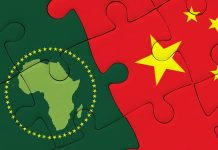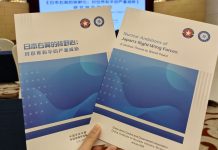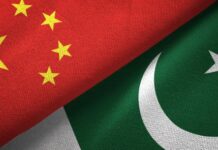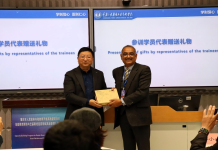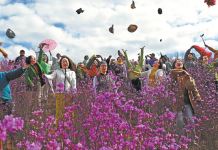Shenzhen: Born in the 1980s, Huang Xiaoyong is an entrepreneur who used to run a foreign trade company in Shenzhen, Guangdong Province, with an annual turnover exceeding 10 million yuan ($1.5 million). Had Huang stuck to his original trajectory in life and stayed put in Shenzhen, he would have nothing to do with farming later in life.
However, in 2014, when Huang’s home county Shicheng in Jiangxi Province in east China introduced a series of policies to encourage business and attract investment in a bid to facilitate poverty alleviation work, he returned home and devoted himself to developing modern ecological agriculture and teaching his fellow villagers how to make more money.
“As an entrepreneur, I have the responsibility to help the poor families around me rid themselves of poverty as soon as possible,” Huang told China Youth Daily.
Huang received a national award on October 17 in Beijing for his outstanding work in the field of poverty alleviation. The day was also the seventh National Poverty Relief Day and the 28th International Day for the Eradication of Poverty.
The national awards for outstanding work in the field of poverty alleviation, initiated by the State Council Leading Group Office of Poverty Alleviation and Development, are given annually since 2016. Individuals are awarded as role models for shaking off poverty themselves or assisting others to do so. Since 2018, organizations, too, have received accolades for their contributions to poverty alleviation.
The award ceremony received more public attention this year as the deadline for the country to eradicate absolute poverty looms. “The awards encourage people in poverty-stricken areas to eradicate poverty through hard work,” Wang Sangui, a member of the expert advisory committee of the State Council Leading Group Office of Poverty Alleviation and Development, told China Youth Daily.
While running a startup business elsewhere before, Huang remained concerned about the development of his hometown, especially Aobei Village, where he was born and raised.
There are over 2,000 people in Aobei. The per-capita arable land there is meager. Also, the village is located in a mountainous area, which made it difficult to increase the villagers’ income and develop the village.
Huang returned to his hometown and with his business experience, set up companies. Through research, he found the purple shale soil commonly seen in Aobei to be rich in nutrients such as potassium, calcium and phosphorus, and perfect for growing quality fruits.
Together with his business partners, Huang in late 2014 started to cultivate large patches of barren hills and fields in order to set up a modern agricultural industry demonstration park.
He had never expected his efforts to go down the drain in the following year. Shicheng suffered severe flood and large-scale landslides that swept across his new orchards.
Millions of yuan vanished, while the reconstruction and restoration cost time and more money.
Despite villagers voicing their doubts, Huang remained confident about the prospect of developing ecological agriculture.
With the help of the local government, he obtained a national funding earmarked for water and soil conservation.
By reading books and learning from experts, Huang gained knowledge about water and soil conservation and organized villagers to protect the healthy vegetation growing on the mountains and harness mountain streams for flood prevention, water storage and irrigation. The restituted flooded land was transformed into a renowned agricultural sightseeing park.
– The Daily Mail-Beijing Review News exchange item


